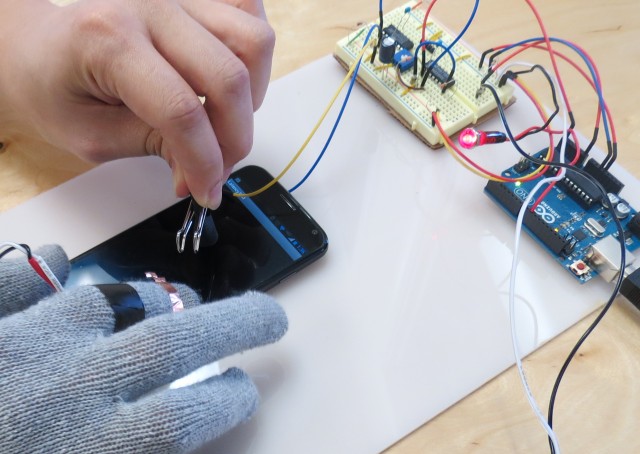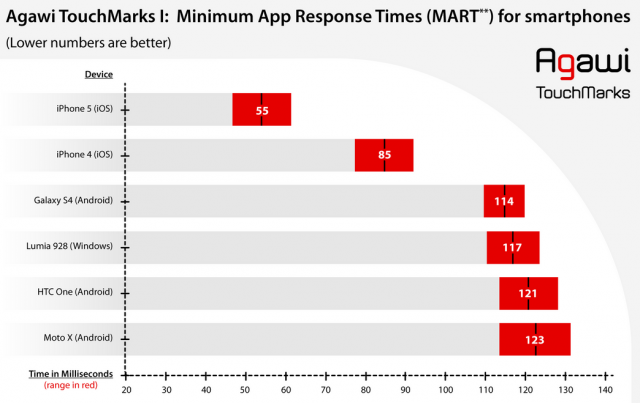Cloud streaming app provider Agawi has released the results of its testing of a variety of multi-touch mobile devices for responsiveness.
Agawi’s tests are designed to measure the ‘minimum app response time’ (MART) for each mobile device. This represents the best response time you can expect to see between the time when you touch the device and the app responding. This is a distinct issue from the more widely discussed differences in audio latency between mobile devices.
The researchers found the iPhone 5 responds more than twice as fast as any Android and WP8 device they tested:
These results have several implications for mobile musicians.
First, the touchscreens on iOS devices are significantly more responsive than on other platforms. This could help deliver a better ‘feel’ in multitouch music apps.
Second, 55ms is a best-case scenario, so demanding music apps are likely to respond more slowly. This may be a contributing factor that helps determine the ways musicians user multi-touch devices.
More research would be welcome in this area – and also comparing the latencies introduced by the touchscreen, vs wired and wireless controllers that musicians use with mobile devices.
iPhone Apps ‘Will Simply Feel More Responsive’
Here’s what the researchers have to say about their results:
At a MART of 55ms, the iPhone 5 is twice as responsive as any Android or WP8 phone tested. All the Android devices’ MARTs fell in the same 110 – 120ms range, with the WP8-based Lumia 928 falling into that bucket as well.
There are several possible reasons for this. Since touchscreen hardware has significant latency itself, our best guess is that Apple’s touchscreen hardware is better optimized or more sensitively calibrated for capturing and processing touch. Another possibility is that while the Android and WP8 code are running on runtimes (Dalvik and CLR respectively), the iPhone code is written in closer-to-the-metal Objective-C, which may reduce some latency.
Regardless of the reasons, the conclusion is clear: the best written apps on iPhones will simply feel more responsive than similar apps on the current gen of Android devices.
Agawi plans to open source the hardware and software used in its testing, so that others can replicate their results, improve their methodology and use the tools to improve the responsiveness of mobile apps.
Check out the results of their research and let us know what you think!



Yay, I love any news that pisses off Apple haters.
what an enthralling life you must lead..!
Wait for Android 4.4 Kitkat and re-do the tests …
Sadly, you probably will have to wait until you upgrade your device.
Many carriers never release updates for older Android mobiles, so most users are on old versions of the OS.
These results, though significant in themselves, I think will not affect the music apps publishers’ focus from Android to iOS or vice versa. There are multiple other factors that weigh in in deciding for which platform one wants to program for to reach a wider consumer crowd. And iOS right now is already established as the preferred mobile platform for musicians than Android or Windows. These results are most beneficial for Android so they can focus on this issue as well, besides latency, multiple Android versions and compatibility between them etc. if they want to focus on mobile music making apps. And from a financial point of view I think they should.
What kind of loser would use an android device to make music anyways?!!
That sort of attitude is unfortunate.
This sort of comparison is great so that musicians and other users can make educated decisions. Many people think that Apple devices are ripoffs because they see cheaper alternatives that look very similar.
Apple doesn’t talk about touch latency, audio latency or MIDI latency on iOS, because most people’s eyes would glaze over. But every third-party comparison shows iOS devices being VASTLY superior in these three areas.
Is the terrible performance of Android devices the reason why Android users seem to be so ‘meh’ about mobile music apps?
It isn’t Apple’s® & apple’s. Instead of thinking that people buy these devices to make music. Remember that most folks buy them as phones and/or media players. The fact that they can add fun little apps for 5 or 10 bucks that do some musical tricks at worst, and at best can make good synth sounds, drum beats, remote control a live mixer, and do some reasonably good mix-down (Auria).
The snobbery that expresses itself in these comments has elements that are justifiable, but are mostly pointless. Yes, MANY people have unrealistic expectations of their touch devices. And YES, the hype is over-the-top. But mostly people understand that there are professional apps on computers that do things VERY well, and there are consumer apps on touch devices that do things relatively well. Comparing them is a useful exercise. Insulting people who use touch device apps says more about the insulter.
It was only two months after the iPad(1) was released that KORG came out with the iElectribe app and I was sold on the spot. I remember thinking that the quality and ease of use meant this thing was going to be a hit with musicians. I’ve sent maybe 3 emails on the thing in the last 3 years…. for me iOS is about music apps.
But then again, you said ‘MOST PEOPLE buy them as phones/media players’.
What kind of loser uses phones to make music? Repeat after me: i-n-s-t-r-u-m-e-n-t-s…
The most boring music is usually made by people that have close-minded views of ‘music’ and ‘instruments’.
sorry, ridiculous statement.
this “idiot” has a degree in classical music and had been playing professionally since he was 16.
grow up. it’s a tool.
your attitude is not that far off from every acoustic purist who thought an electric bass was heresy and that electric keyboards were the death of music.
or perhaps music would be better if it stopped changing around the time of mozart.
The only real difference between my iPhone and my synth is the interface…
Yes! this is exactly the attitude that people need to have towards ios devices for music. I wanted to get a wavetable synthesizer, so I bought an ipad mini, and iconnect midi 2+, Nave and Wavegenerator. Now I don’t have to decide wether I want to go for the PPG or Waldorf sound, I just get both, and for 20 bucks a pop no less! It works wonderfully once I got used to the idea of using a touch interface and they both sound incredible, totally just as good as hardware or VSTs. And it doesnt end at synths, I use it with logic remote and touch osc as well to do everything from control my daws to program my mopho not looking back at all on my knob and slider covered controllers. Konkreet performer is no joke as well! Now all I have to do is wait for touchable 2… Anyway point being that my $330 dollar ipad has successfully replaced hundreds of dollars in synths and midi controllers. Now I want a second ipad!
Um…like….NOT! I have a music degree and play many instruments-been on tour-bla bla bla….the iphone and ipad are game changers no doubt about it…they ARE indeed very powerful instruments….of course on should lean the science behind music if they are serious etc etc…just sayen…:)
Androids latency and lack of connectivity to the outside world make it a total non starter. I love my new S4 but I’m keeping my 4s for music making.
http://createdigitalmusic.com/2013/05/why-mobile-low-latency-is-hard-explained-by-google-galaxy-nexus-still-android-of-choice/
so they didn;’t test THE android phone form google, the nexus 4?
DOh!
The galaxy s4, htc one and moto x are the top Android phones, so it makes sense to test them.
They didn’t test the iPhone 5s either, which probably blows away it’s predecessor, like the 5 blows away the 4.
Google has added specific audio latency enhancements to the most recent version of Android that are enabled in the Nexus 4 kernel but not necessarily by the other manufacturers.
It would certainly make sense to me that they should test it.
Although an iOS user, I would use whatever lets me create good music…Apple, Android, whatever. I use an iPad & iPhone because they work…and there are a lot of apps that work well for iOS.
So if I’m understanding correctly, the total latency would be the MART described in this article – the time it takes the app to register screen input – plus whatever other audio processing latency happens inside the app. In my (somewhat limited) experience with iOS apps – whether controlling softsynths via something like TouchOSC or using apps that generate audio – they feel very snappy. I certainly don’t feel the 55ms app response that these tests suggest is a baseline latency. Am I misunderstanding something?
Pretty much ALL I use Apple products for is making music. I couldn’t afford this much crazy sonic firepower using either hardware or VSTs! Bless ’em.
Good thing I don’t use a phone to make music.